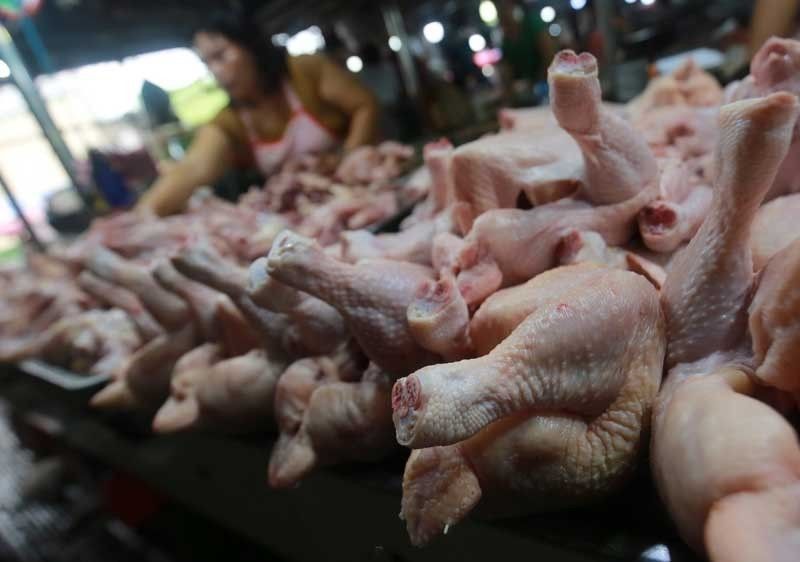Marcos extends lower tariff on deboned poultry meat until 2024

MANILA, Philippines — Meat importers will get to enjoy extended low tariff rate on mechanically deboned meat (MDM) of chicken and turkey for another two years after President Marcos signed Executive Order (EO) 13.
Signed on Jan. 13 but posted on the Official Gazette late Thursday, EO 13 extended the five-percent tariff on MDM of chicken and turkey until end-2024.
By 2025, MDM tariffs will revert to 30 percent in-quota and 40 percent out-quota starting this year.
According to the EO, there is a need to maintain the reduced tariff rates on MDM of chicken and turkey “to ensure continued supply of essential food products at affordable prices, diversify the country’s market sources, and help businesses recover and sustain their operations.”
It cited the lingering impact of the COVID-19 pandemic and other factors that affected the supply of the said commodity, as well as high inflation due to supply constraints, expected shortage in the global supply and rise in commodity prices worldwide.
Retaining the five percent tariff rate on MDM was endorsed by the National Economic and Development Authority (NEDA) board on Dec. 28, 2022.
A review is set on the MFN tariff rates after one year, when NEDA will submit its findings and recommendations anew.
The Philippine Association of Meat Processors Inc. (PAMPI), which filed the petition with the Tariff Commission to keep the five percent tariff on MDM of chicken and turkey until 2025, lauded the President’s decision, saying it would help keep prices of processed meat products stable and reasonable.
“We would like to thank the President and the NEDA board for fully appreciating the positive impact that the five percent tariff on MDM would have on prices of processed meats such as hotdogs, luncheon meats, siomai and other products; on the continued viability of our industry and on the national economy in general,” PAMPI president Felix Tiukinhoy said in a statement.
“Contrary to the belief of a few people in the livestock sector, the President’s decision reflects his wisdom and sincerity in protecting the interest of the majority of Filipinos, as this will help provide millions of consumers with affordable meat products,” Tiukinhoy said.
When the move was first proposed, local producers had fought to reject it, to allow the embattled local poultry production to compete.
The sector has been fending off the Highly Pathogenic Avian Influenza (HPAI), or bird flu, and grappling with high feed costs.
“We look forward to the day when domestic producers would be able to produce MDM in commercial volumes so that we can revive and expand our support to the local agriculture sector,” Tiukinhoy said.
In a Viber message, United Broiler Raisers Association (UBRA) president Elias Jose Inciong said the government still needs to analyze the benefit of the extended low tariff on consumers as against lost government revenues.
“It really needs more study if the consumers benefit from the ‘savings.’ We are talking of billions in lost revenues in order to assist meat processors ostensibly to help the consuming public,” he said.
“In addition, it is widely known that it is used by unscrupulous players in technical smuggling because of the tariff differential,” Inciong said.
Samahang Industriya ng Agrikultura (SINAG) executive director Jayson Cainglet said the lowering of MDM tariff in the last two years did not result in reduced prices of processed and canned meat products.
“Reverting to its original tariff rate will have insignificant price increase, based on actual computations. The injustice being suffered by the livestock industry will continue as the concession in lowering MDM tariff was a historical injustice to the livestock industry, poultry raisers and local agriculture sector,” he said in a separate Viber message.
Last year, MDM comprised 59 percent of total chicken imports, according to Bureau of Animal Industry data.
The United States Department of Agriculture (USDA) raised its chicken imports forecast this year to 475 million metric tons (MT) from 450 million MT.
The new projection is flat compared to last year, reflecting steady demand.
MDM is a paste-like meat product produced by forcing pureed or ground beef, pork, turkey or chicken, under high pressure through a sieve or similar device to separate the bone from the edible meat tissue.
It has been used since the late 1960s in certain meat and meat products, such as hotdogs, luncheon meats and sausages, and does not compete against table grade meat.
- Latest
- Trending































